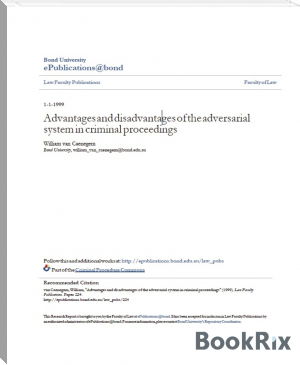Critical Analysis: Islamic Legal Interpretation, Muftis and Their Fatwas - Sehrish Saba, Nusrat Azeema (best fiction books to read txt) 📗

- Author: Sehrish Saba, Nusrat Azeema
Book online «Critical Analysis: Islamic Legal Interpretation, Muftis and Their Fatwas - Sehrish Saba, Nusrat Azeema (best fiction books to read txt) 📗». Author Sehrish Saba, Nusrat Azeema
This chapter is written by all the three editors of the book as introduction to the volume and to create a background of the subject. Islamic legal system of interpretation is based on two distinct categories of legal interpreters, qadis (the judge) and muftis (jurisconsult). In addition to courts, early Islamic jurists provided a legal aid service in the form of legal consultants called muftis. In their different venues, both qadis and muftis have specialized in handling the everyday traffic in conflicts and questions falling within the purview of the Shari’a[1]. Any Muslim could approach the mufti and seek his expert opinion, or fatwa, on a question of Islamic law. The fatwa was non-binding advisory opinions of the muftis but rest on the high degree of authority that is equivalent to the recognized Anglo-American legal mechanism of case law precedent.
This chapter explains the history and transformation of issuance of fatwa traced back from the Quranic revelation on Prophet Muhammad (s.a.w.) when one or more members of the community or companion of the Prophet (s.a.w.) approached the Prophet (s.a.w.) and ask for clarification of certain issue over which the Prophet (s.a.w.) sometimes wait for revelation from Allah almighty (known as quranic text) or sometimes without awaiting the reaction of the divinity, responds immediately (known as hadith).
In 632 A.D after death of the Prophet (s.a.w.), Muslims turned to the companions of the Prophet (s.a.w.) for their guidance in new issues arising due to the expansion of Islam and Muslims beyond the boundaries of Arab. Approximately one hundred thirty companions functioned as muftis during the seventh century. Among others, some renowned muftis of that time were Mu’ad bin Jabal, Zayd bin Thabit and Ibn-e-Abbas.
After the death of companions of the Prophet (s.a.w.), the era of ulama (scholars) and fuqaha (jurists) came. In Mecca, Madina, Damascus, the Yaman and other countries eminent scholars like al- sha’bi, al- zuhri, makul and tasu generated discrete legal materials that were used by subsequent generations of scholars to create the fully developed system of Islamic law. This special class of scholars acquired religious authority analogous to that exercised by the Prophet (s.a.w.). They were called as human interpreters of God’s will on earth.
Under the heading of institutional manifestations history of futya (legal consultation) is discussed. Initially futya or legal consultation was a private activity of the mufti or jurist but gradually in some parts of the world the activity of futya acquired a public and official nature. During the period of Umayyad, muftis served as legal consultants for judges and issued fatwas at the request of provincial governors as well. In the second half of the tenth century, process of collection of fatwas of the muftis began to appear and continued. This fatwa collection was classified mainly as sunni fatwa collection, which was further divided into hanafi, malki, shafi’i and hanbali’s school of legal thoughts and shi’is fatwa collection consistent of ja’faris school of thought. As the demands of fatwas increased the official department for issuing fatwas known as office of shaykh-ul-Islam was establish during the Ottoman period (1516-1918). The fatwas issued by the shaykh ul- Islam were systematically recorded in registers, and those issued by certain distinguished shaykhs were collected in book form as well.
Under the division of adab al- mufti not only qualifications and status of muftis is defined but basic identity of mufti, the formal requirements of this position and character of the interpretive relation between muftis and questioners is also discussed.
Under the heading of modern muftis, the changes and transformation in the character of muftis and issuance of fatwas is been discussed according to which one of the fundamental change having direct impact on muftis is the transformation in the essential character of knowledge and its means of transmission. Shari’a or fiqh has been largely displaced by secular subjects, derived from western model. Study of fiqh is removed from Islamic institutes or to specialized law schools where it competes with offerings in western-style law. Educational systems are now producing lawyers and law professors instead of muftis. Codifications powerfully harnessed the Shari’a materials. Interpretive authority has been passed from the hands of individual jurists and muftis to the collective bodies of national legislatures.
In recent years, fatwas has become a media phenomenon, for example, in cases of assassination of Anwar al- Sadat and the condemnation of sulman Rushdie. Scope of the modern fatwas appears broader in social address, religious issues and family law as compared to strict legal issues. The concept of istifta (request for a fatwa) is also altered with popular concept of referendum or plebiscite.
[1] Islamic law
Ifta’ and Ijtihad in Sunni Legal theory: A Development Account
This chapter of the book is about Ifta’[1] and Ijtihad[2] in sunni legal theory: a development account. Islamic legal theory always worked for the establishment of the principles and precepts to govern the procedure of Ijtihad or legal interpretation. The institution of ifta’ and mufti are deeply concerned with the process of transmitting the outcome of Ijtihad to the people. So, the question arises here is whether the mufti had to be a mujtahid or not? To answer this query the writer of the book presented views of different scholars of the different era and tried to demonstrate us the gradual transformation to this idea that whether a mufti must have the qualities of mujtahid or any person can give fatwa?
The writer began from the eighth century with the views of al-Shafi’i (d. 820) who does not expressly mentioned this fact that mufti must be capable of Ijtihad but the criteria presented by him clearly indicated that a person less than mujtahid can not be a mufti or cannot give fatwa. According to al-Shafi’i qualities of knowledge in which one must be proficient in order to qualify as a mufti include skilled knowledge of the quran, of the Prophet’s (s.a.w.) sunnah, the Arabic language, the legal questions subject to consensus and art of legal reasoning (qisas).
Uptill tenth century, the scholars were having the same views regarding the mufti. Abu al- hasan al-basri (d. 1044) maintains the views of al- shafi’i and clear this thing that ifta’ means the exercise of Ijtihad and nothing less than this. Al- basri was deeply against the muqallid[3] to practice ifta’ because as per his view logical conclusion and the aftermaths of allowing a muqallid to practice ifta’ would be severe. He does not give a muqallid status of more than a layman.
In eleventh century majority jurists maintained directly or indirectly the same view that Ijtihad is a prerequisite for giving fatwa. The jurists of this century followed the footsteps of their predecessors in affirming that to be a mufti is nothing short of a mujtahid.
In twelfth century an interesting change and gradual transformation to this view is found. Al- amidi (d.1234) presented the view that a mujtahid within a legal school (mujtahid fi’l- madhhab), who is knowledgeable of the methodology of the independent mujtahid whom he follows, and who is capable of deriving rules in accordance with this methodology and defending his position in scholarly debates, is entitled to practice ifta’. Ibn al- hajib (d. 1248), a younger contemporary of al- amidi, goes further by presenting the view that a jurist who is not himself a mujtahid within the legal school of mujtahid (mujtahid fil-madhhab) is entitled to issue fatwas if he is knowledgeable of a madhhab and is able to reason properly. Ibn al-salah al- shahrazuri (d. 1248), contemporary of ibn al-hajib takes another step in articulating the change. He divides the muftis into two kinds as independent mufti, the one who follows the teachings and methodology of no one else and who has established his own legal school (madhhab) and muftis who are not independent. Ibn al- salah further divides those who are not independent muftis into four kinds as per their descending degree of knowledge.
By the middle of thirteenth century, it seems common to allow the muqallids to occupy the office of ifta’. Ibn abd al- salam (d. 1261) issued a fatwa on the query that who is entitled to issue fatwa. Al- salam maintains that if a mufti does not meet the requirements of absolute Ijtihad, then he may be a mujtahid fil- madhhab, he may still issue a fatwa on points of law where he feels, beyond any shade of doubt, that he is competent. Ibn daqiq al- id (d. 1302) gone further and maintained that it is sufficient if the mufti is just (adl) and is knowledgeable of the school of the mujtahid whom he cites in his fatwa as in times of ours it is difficult to have fatwas on the basis of ijtihad. The great majority of subsequent theoreticians maintained the same concession for mufti- muqallid.
Through this chapter the writer demonstrated from Sunni school of thought the development in the institution of issuance of fatwas in relation to qualification of the muftis to issue fatwas in changing situations.
[1] The act of issuing fatwas
[2] Independent reasoning; authentic scholarly endeavour
[3] Practitioner of taqlid; a person who follows school doctrine because he is not qualified to engage in deductive and analogical reasoning
Learning at Mosques in al- Andalus
This chapter refers to first fatwa of the book underhand. The scheme of the writers to present the fatwas from chapter three to onward is that first, writer explained the context to which the fatwa presented by him belonged, then translation of fatwa is given in the form of question and answer which is followed by analysis of the fatwa by the writer.
Chapter three is containing a fatwa regarding the learning at mosque in al- Andalus. In the start, writer discussed pivotal role played by Mosques in the lives of Muslims. The query raised in the fatwa deals with the issue of Mosques to be used as public place. In two short paragraphs the writer presented the views of the judicial advisors (muftis) that teaching in mosques and gathering there to discuss religious knowledge must be permitted. The only authority quoted is Malik bin Anas, as in al- Andalus teachings of Maliki school





Comments (0)